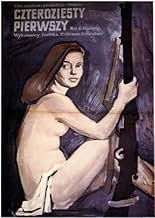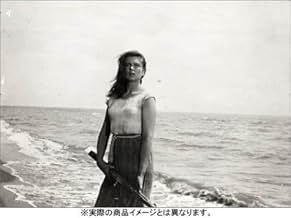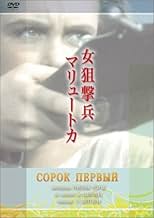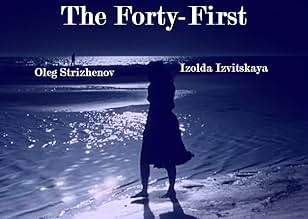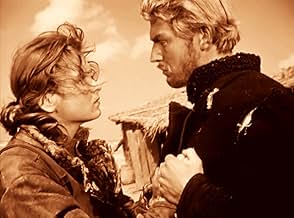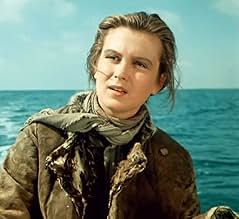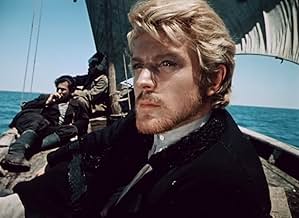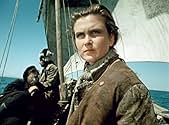Sorok pervyy
- 1956
- 1h 28m
ÉVALUATION IMDb
7,5/10
1,8 k
MA NOTE
Une romance inattendue survient entre une tireuse d'élite de l'Armée rouge et un officier de l'Armée blanche.Une romance inattendue survient entre une tireuse d'élite de l'Armée rouge et un officier de l'Armée blanche.Une romance inattendue survient entre une tireuse d'élite de l'Armée rouge et un officier de l'Armée blanche.
- Prix
- 1 victoire et 1 nomination au total
Nikolai Dupak
- Soldier Andrei Chupilko
- (as N. Dupak)
Georgi Shapovalov
- Soldier Terentyev
- (as G. Shapovalov)
Lev Kovylin
- Soldier Kovylin
- (as L. Kovylin)
Yuriy Romanov
- Soldier Vyakhir
- (as Yu. Romanov)
Daniil Netrebin
- Soldier Semyannin
- (as D. Netrebin)
Asanbek Umuraliyev
- Soldier Umankul
- (as A. Umuraliev)
Anatoli Kokorin
- Soldier Yegorov
- (as A. Kokorin)
Vadim Sinitsyn
- Wounded soldier
- (as V. Sinitsyn)
Kirey Zharkimbayev
- Timerkul
- (as K. Zharkimbayev)
Histoire
Le saviez-vous
- ConnexionsFeatured in Fejezetek a film történetéböl: A szovjet film 1953-1970 (1990)
Commentaire en vedette
The feature debut of Soviet Union director Grigoriy Chukhray (who would subsequently acquire international fame for BALLAD OF A SOLDIER in 1959, his second feature), THE FORTY-FIRST is a potentially engrossing romance happens in the two warring parties during the Russian civil war, a Red Army sniper Maria (Izvitskaya) and a White Army officer Lieutenant Vadim (Strizhenov).
The storyline is straightforward and linear, based on the eponymous novel by Boris Lavrenyev. Maria is among a defeated Red Army unit, leaded by Commissar Yevsyukov (Kryuchkov), she is a marks-woman, who has already claimed forty lives of her enemies. On their route to retreat in Karakum Desert, the group captures Vadim, aka. the titular forty-first which miraculously survives Maria's bullet, who is carrying a secret oral message to a White Army general, so they keep him as a captive and the Commissar puts him under Maria's guard. When they finally arrives at the Aral Sea, Maria and two other soldiers are entrusted to take Vadim on a boat to their headquarter in Kazaly, but stormy weather causes the boat stranded on a nameless island, and only Maria and Vadim have survived. The seclusion becomes a hotbed for their mutual affection which has engendered throughout their journey to bloom, Maria's nurturing nature, her passion for writing verses and aspiring to acquiring further education and Vadim's erudite knowledge, his "dangerous" blue eyes, bring them closer, not as sworn enemies, but two tender souls, a scintillating paragraph, where they finally embrace and smooch, after Vadim tells her the story of Robinson Crusoe and jokes that she is his "Man Friday". They share the most joyous time on the island, in spite of their ideological disparity of war and life, it is something they must adjust and reconcile for the sake of their love, and at one time, it seems working, they are frank to each other and decide to face the uncertain future together, a happy-ending beckons when a boat is approaching to rescue them, but the climax arrives so abrupt and emotionally manipulative in the coda, when the true identity of the boat is revealed, Maria's almost spontaneous reflex brings a poignant doom to the pair of star-crossed lovers, echoes the portentous title.
From the gaping geographical shifting, starts in the desert, to the choppy Aral Sea, terminates on the isolated island, perpetually under an indigo shade, Chukhray emerges as a staunch craftsman in grappling with the diversity of locations, also revels in bestowing an ethnographic touch with its disinterested depiction of Auls people. More bracingly, considering it time, the film is pluckily against the grain of the propaganda exploitation in the Soviet industry at then, humanises the image of a White Army officer, and inspires audience to empathise the genuine affection regardless of their political beliefs, even though the ending could be read as a heroic feat of the loyalty to the Red Army, more resoundingly yet inconspicuously, one cannot help but becoming cognizant of the detrimental power which a radical code of belief can afflict on its subject, to brainwash them, to call on unconditional sacrifice with no bottom-line. Rather than arguing whether the Red or the White serves as the object of Chukhray's admonition, it seems to me, the real deal is the war itself, a diabolical act disguised as a manifestation of patriotism with disastrous outcome, but in essence, only capitalised on by those few warmongers for some elephant-in-the- room self-serving interests, yet, the same thing continues to repeat itself, again and again, no end is in sight. As for the film itself, my admiration is ample and well-grounded.
The storyline is straightforward and linear, based on the eponymous novel by Boris Lavrenyev. Maria is among a defeated Red Army unit, leaded by Commissar Yevsyukov (Kryuchkov), she is a marks-woman, who has already claimed forty lives of her enemies. On their route to retreat in Karakum Desert, the group captures Vadim, aka. the titular forty-first which miraculously survives Maria's bullet, who is carrying a secret oral message to a White Army general, so they keep him as a captive and the Commissar puts him under Maria's guard. When they finally arrives at the Aral Sea, Maria and two other soldiers are entrusted to take Vadim on a boat to their headquarter in Kazaly, but stormy weather causes the boat stranded on a nameless island, and only Maria and Vadim have survived. The seclusion becomes a hotbed for their mutual affection which has engendered throughout their journey to bloom, Maria's nurturing nature, her passion for writing verses and aspiring to acquiring further education and Vadim's erudite knowledge, his "dangerous" blue eyes, bring them closer, not as sworn enemies, but two tender souls, a scintillating paragraph, where they finally embrace and smooch, after Vadim tells her the story of Robinson Crusoe and jokes that she is his "Man Friday". They share the most joyous time on the island, in spite of their ideological disparity of war and life, it is something they must adjust and reconcile for the sake of their love, and at one time, it seems working, they are frank to each other and decide to face the uncertain future together, a happy-ending beckons when a boat is approaching to rescue them, but the climax arrives so abrupt and emotionally manipulative in the coda, when the true identity of the boat is revealed, Maria's almost spontaneous reflex brings a poignant doom to the pair of star-crossed lovers, echoes the portentous title.
From the gaping geographical shifting, starts in the desert, to the choppy Aral Sea, terminates on the isolated island, perpetually under an indigo shade, Chukhray emerges as a staunch craftsman in grappling with the diversity of locations, also revels in bestowing an ethnographic touch with its disinterested depiction of Auls people. More bracingly, considering it time, the film is pluckily against the grain of the propaganda exploitation in the Soviet industry at then, humanises the image of a White Army officer, and inspires audience to empathise the genuine affection regardless of their political beliefs, even though the ending could be read as a heroic feat of the loyalty to the Red Army, more resoundingly yet inconspicuously, one cannot help but becoming cognizant of the detrimental power which a radical code of belief can afflict on its subject, to brainwash them, to call on unconditional sacrifice with no bottom-line. Rather than arguing whether the Red or the White serves as the object of Chukhray's admonition, it seems to me, the real deal is the war itself, a diabolical act disguised as a manifestation of patriotism with disastrous outcome, but in essence, only capitalised on by those few warmongers for some elephant-in-the- room self-serving interests, yet, the same thing continues to repeat itself, again and again, no end is in sight. As for the film itself, my admiration is ample and well-grounded.
- lasttimeisaw
- 26 déc. 2015
- Lien permanent
Meilleurs choix
Connectez-vous pour évaluer et surveiller les recommandations personnalisées
- How long is The Forty-First?Propulsé par Alexa
Détails
Contribuer à cette page
Suggérer une modification ou ajouter du contenu manquant

Lacune principale
By what name was Sorok pervyy (1956) officially released in India in English?
Répondre
